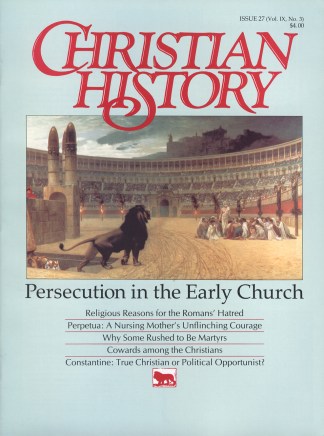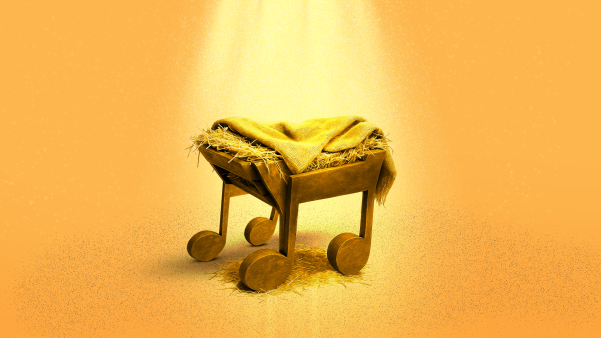Charles Dickens has been called “perhaps the greatest of English novelists.” Some may consider such a tribute an exaggeration, but no one can deny his genius and tremendous contribution to literature.
Throughout his life, Dickens was a champion of the poor and oppressed, as well as a critic of aristocratic and High-Church elitism. Popular works such as David Copperfield, A Christmas Carol, and Pickwick Papers reveal his contempt for the corruption and folly in Victorian England’s business, law, religion, and education. “In Our Mutual Friend,” writes Neil Philip, citing one example, “[Dickens] depicts a [religious] leacher ‘drawling on to My Dearerr Childerrenerr … about the beautiful coming to the Sepulchre; and repeating the word Sepulchre (commonly used among infants) five hundred times, and never once hinting what it meant.’ ”
Taste of Poverty
Dickens’s life follows a classic rags-to-riches story. He was born at Landport, in Portsea, on February 7, 1812. His father, John Dickens, was a clerk in the navy—a job that enabled the family to live at a comfortable, but not overly indulgent, middle-class level.
Unfortunately, careless money management and difficult times contributed to John Dickens’s financial decline in the 1820s. Household items had to be sold, and Charles was given the unsavory task of taking treasured family books to the local pawn shop. At the tender age of 12, Charles was sent to work in a dingy blacking house. This dashed all hope of his getting a proper education. To make matters worse, his father ended up in debtors’ prison.
Work in the blacking house lasted from 8 A.M to 8 P.M., with one hour for dinner and 30 minutes for tea. He made the best of his situation, and in time it became apparent to the foreman that Charles was different. He not only carried himself in a manner unlike the other boys’, he also outworked them.
Upon his father’s release from prison, Charles went back to school. He developed shorthand and landed a job as a parliamentary reporter—first for The True Sun, then the Morning Chronicle. And he contributed articles to the Monthly Magazine and Evening Chronicle.
Disenchantment with Religion
The influence of religion was ever present in Dickens’s life, even though he didn’t engage in religious activity to any noticeable degree. Biographer Edgar Johnson writes that Dickens’s parents “were Church of England, though not at all devout, or interested in matters of doctrine.… They did not even attend church very regularly.” Young Charles was also subjected to the boring messages of Baptist minister William Giles. With these experiences to reflect upon, Dickens developed a dislike for the church. G. K. Chesterton wrote that “the tone of Dickens towards religion, though like that of most of his contemporaries, philosophically disturbed and rather historically ignorant, had an element that was very characteristic of himself. He had all the prejudices of his time. He had, for instance, that dislike of defined dogmas, which really means a preference for unexamined dogmas.”
This attitude did not come by accident; it was neatly cultivated by a life of unpleasant experiences with formal religion. Dickens’s contempt should not be construed, however, as a hostility toward God or Jesus Christ. He merely observed that the church, for all its dogma and ceremony, failed to realize, at least in practice, the need for social action.
In 1834, for example, Sir Andrew Agnew attempted to pass a bill prohibiting recreation and work on Sunday. This infuriated Dickens, for it reflected the fanatical side of religion he had grown to hate. The wealthy enjoyed leisure throughout the week because their money enabled them to hire others to do their work, but the poor worker had to labor six days, leaving only Sunday for recreation and other needed activities. Now the religious zealots wanted to take that brief source of pleasure from those who needed it most.
Dickens attacked the bill with a pamphlet titled Sunday Under Three Heads: As it is; As Sabbath Bills would make it; As it might be made. The bill was never enacted, but the issue did entrench his disdain for rabid religiosity.
Dickens became involved with a system that attracted many fellow intellectuals: Unitarianism. It enabled him to live without the dogmatic creeds of historic Christianity, yet affirm the existence of God and the humanity and divine mission of Jesus Christ. And Unitarianism promoted social awareness. Writer Robert Browning remarked that “Mr. Dickens is an enlightened Unitarian.” After 1847, however, he did attend the Anglican church near his home. And he prayed each morning and night.
Settling Down to Success
The year 1836 was pivotal for Dickens. He married Catherine Hogarth on April 2 and began a family that eventually expanded to ten children. Also, his writing career was launched in earnest. Chapman and Hall hired him to write the brief text for a series of sporting plates by illustrator Robert Seymour. Dickens initiated an alternate plan that gave birth to the Pickwick Papers. At the same fume, Oliver Twist was coming out in the periodical Bentley’s Miscellany. Dickens was now an established writer with a growing reputation. His popularity crossed the Atlantic, and soon he was on his way to America, where he was received with enthusiasm.
Dickens conveyed his social concerns to a vast number of people via his novels. He made it a point to expose injustice. A case in point is the anti-Catholic riots of that era. By no means was Dickens sympathetic toward Catholicism, but he hated bigotry. In 1841 he wrote Barnaby Rudge, which exposed the foolishness of the anti-Catholic period and those who encouraged it.
“God Bless Us, Every One”
Even though Dickens hated established religion, he maintained a sensitivity toward the social principles of Christianity, principles he made quite clear in one of his most popular and endearing novels, A Christmas Carol.
Written when Dickens was 31, this tale of ghosts and greed so thrilled him that he literally wept and laughed over it. The protagonist, Scrooge, is an oppressing, greedy, lover of money—a cold, wretched shell of a man who has lost all sense of kindness. Of all the characters in the Dickens gallery, the old miser is the most memorable representation of that which Dickens hated in individuals and society.
The moral and spiritual values sprinkled throughout the story are priceless. For example, Scrooge equates happiness with wealth; ironically, he is the most unhappy character. Scrooge remarks that those who are unable to care for themselves would do society a favor by dying, thereby helping decrease the surplus population. Later, however, Scrooge is taken by the second Spirit to visit the home of his impoverished employee Bob Cratchit. Scrooge develops a personal interest in Tiny Tim, the lovable boy who suffers from a potentially fatal ailment. Scrooge inquires about Tim’s health, and the Spirit states that the boy will die unless the old miser changes his ways. But who cares, for “If he be like to die,” says the Spirit, “he had better do it, and decrease the population.” Scrooge hangs his head in shame.
Eventually, Scrooge sees the folly of his way and exclaims, “I am not the man I was. I will not be the man I must have been but for this intercourse.” A religious conversion? The “salvation” of Scrooge comes not from an encounter with Christ, but an encounter with self. He displays the Dickensian view that salvation is achieved by loving your neighbor, giving a cup of water to those in need. The New Testament teaches that such acts are the result of spiritual conversion; for Dickens, they were the means.
A Secret Work Revealed
In 1849, Dickens wrote an important manuscript that would not be printed until 1934. This work was so personal to him that he requested it not be made public for 85 years. The work was a retelling of the Gospel narratives, titled The Life of Our Lord. Marie Dickens, Charles Dickens’s daughter-in-law, offered this fitting description of Dickens’s secret work:
“This book, the last work of Charles Dickens to be published, has an individual interest and purpose that separate it completely from everything else that Dickens wrote. Quite apart from its Divine Subject, the manuscript is peculiarly personal to the novelist, and is not so much a revelation of his mind as a tribute to his heart and humanity, and also, his deep devotion to Our Lord.”
Dickens wrote The Life of Our Lord so that his children would become familiar with Jesus Christ, and he often read the story to them. When his children left home, he gave each a New Testament (though not an entire Bible). To one, he wrote, “I put a New Testament among your books, for the very same reasons, and with the very same hopes that made me write an easy account of it for you, when you were a little child; because it is the best book that ever was or will be known in the world.… ” The Life of Our Lord most clearly expresses Dickens’s religious disposition. He respected Christianity’s founder, Jesus Christ, who practiced what Dickens so desperately wanted to find in humanity. Jesus loved all people. He rubbed shoulders with social castaways, rebuked wealthy elitists, and severely condemned hypocrisy. If ever a man could gain Dickens’s utmost respect and favor, Christ could, and did.
While certain statements about Christ appear orthodox, the overall picture that Dickens paints cannot be considered orthodox when measured by Scripture or the historic creeds of Christianity. Dickens portrays Jesus as a good man who is loved by God like a son. He writes of the Resurrection, yet glosses over the Virgin Birth and Communion, and he states that one becomes acceptable for heaven by doing good.
One thing is certain, however: Dickens respected the Bible and Christ and sought to instill in his children the same reverence. Near the end of his life he wrote to a reader: “I have always striven in my writings to express veneration for the life and lessons of Our Saviour; because I feel it; and because I re-wrote that history for my children—every one of whom knew it from having it repeated to them—long before they could read, and almost as soon as they could speak. But I have never made proclamation of this from the house tops.”
Unfinished Business
In 1858, Dickens separated from his wife. Some speculate that a chief cause of the marriage’s breakup was his tendency to put himself and his writing first. Dickens then devoted himself increasingly to traveling and public readings of his works. He also developed a relationship with a young actress.
Dickens pushed himself to the limit for so long that his health began to break down. Eventually, he was forced to cease most of his public speaking and resign himself to writing. In 1869 he began work on The Mystery of Edwin Drood, which was interrupted by his untimely death from a seizure on June 9, 1870. He was 58. He was buried in Poets’ Corner, Westminster Abbey.
In his last will and testament, written on May 12, 1869, Dickens wrote, “I commit my soul to the mercy of God through our Lord and Saviour Jesus Christ, and I exhort my dear children humbly to try to guide themselves by the teaching of the New Testament in its broad spirit, and to put no faith in any man’s narrow construction of its letter here or there.”
Dickens despised, and in his books eloquently portrayed, the gross injustices and shoddy lifestyle of many who laid claim to the teachings of Christianity. Yet a fair examination of his life and work shows that he was not a hater of Christ or of Christianity. His friend John Forster concluded that Dickens’s will demonstrates his “unswerving faith in Christianity itself, apart from sects and schisms.”
Stephen Rost, a writer from Mesquite, Texas, is the editor of eight volumes in the Christian Classics Series (Nelson, 1988–9).
Copyright © 1990 by the author or Christianity Today/Christian History magazine.Click here for reprint information on Christian History.









